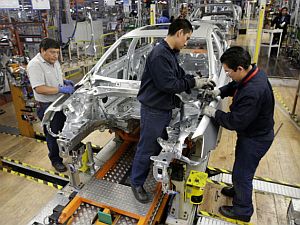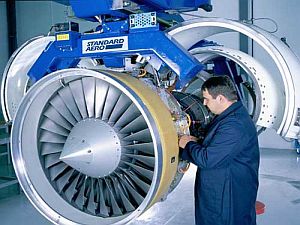When General Motors, the largest automaker in the US, announced last year it would invest some $540 million to expand its plant in Toluca, Mexico, it joined a growing list of manufacturers seeking more bang for their production buck south of the border.
With lower shipping costs and increasingly competitive wages, Mexico is enjoying a manufacturing boom, attracting billions of dollars in foreign investment from firms that are building factories to supply the North American market — a concept known as nearshoring.
Most recently, automakers Nissan, Audi, Honda, and Mazda have all announced plans to open plants in Mexico over the next few years.
Italian tire maker Pirelli said earlier this year it would invest $300 million in new factories in Mexico by 2015, and Swedish appliance maker Electrolux moved a plant last year from Webster City, Iowa to Juarez, Mexico.
Blue-chip aluminum producer Alcoa also expanded its facility in Acuna, Mexico, joining United States' companies already producing there, such as General Electric, Honeywell, and Hawker Beechcraft.
The influx shows no signs of abating.
Foreign direct investment, or FDI, in Mexico reached $19.4 billion in 2011 — with nearly half of that total destined for the manufacturing sector, according to the Mexican Ministry of the Economy.
"Foreign Direct Investment in Mexico has fully recovered from the post-2008 decline, and we anticipate continued strength in manufacturing from autos and aerospace to keep up with US and world demand," writes Sergio Martin, the chief economist on Mexico for investment banking firm HSBC in his 2012 report on the Mexican economy.
 |
Mexico’s Allure
For manufacturers, much of the appeal is lower labor costs, says Gordon Hanson, director of the Center on Emerging and Pacific Economies and economics professor at the University of California, San Diego.
"Until very recently, China had been cheaper, more flexible, and more accommodating to industry, but wages in China are rising at a remarkable clip, putting cost pressure on manufacturers," he said. "Mexico didn’t start to win the battle against China until we started the recovery from the recent recession."
Indeed, the average salary for Mexican workers was $2.10 per hour in 2011, up 19 percent from $1.72 in 2001, according to HSBC.
By comparison, the average wage in China swelled nearly four-fold during those years to $1.63 per hour in 2011 from 35 cents per hour in 2001. Thus, the difference between labor costs in Mexico and China is now just pennies per hour.
There’s also, of course, the cost advantage of proximity, notes Gabriel Lozano, J.P. Morgan’s chief economist for Mexico.
With higher fuel prices, he says, manufacturers worldwide are seeking opportunities to manage shipping costs by producing goods close to their market.
Today, it costs roughly $5,000 to ship a container from China to the US, compared with $3,000 to truck the same freight in from Mexico, says Lozano.
"We expect that trend to continue and build into 2014," he said.
Add to that benign inflation, modest salary growth, a compatible business culture, and faster speed to market, and some suggest Mexico is well on its way to becoming the next manufacturing superpower.
"You have all these factors suggesting that Mexico can become a very important manufacturing hub," said Lozano.
A 2012 survey by global business advisory firm AlixPartners in New York found that those manufacturing companies considering nearshoring indicated Mexico was overwhelmingly the most attractive location from which to operate – ranking it higher than any other country in the Americas, including the United States.
 |
Despite widely publicized security risks stemming from the drug wars, the survey revealed another 43 percent of companies considering offshoring their existing United States' operations also indicate Mexico is their top choice, with China at 30 percent in second place.
"With manufacturing exports growing at current rates, we expect Mexico to displace China as the top US trading partner by 2018, as China’s labor cost advantage shrinks," Martin said in the HSBC report
.Auto and Aerospace
Thus far, the automotive sector has generated the largest share of foreign investment in Mexico among manufacturers, representing 28 percent of total manufacturing exports, or 7 percent of gross domestic product.
"Manufacturing and, in particular, production of automobiles was the key driver of growth, with production of cars soaring in the first half of the year and data for July showing a faster expansion – almost 18 percent, and higher exports explain this growth, in turn, fueled by higher demand from the US," the HSBC report stated.
Mexico is also the world’s first exporter of refrigerators and the second-largest supplier of electronic products to the US market.
But perhaps the biggest potential for growth lies in the aerospace sector, which has been growing more than 20 percent a year since 2004, according to the Mexican Association of the Aerospace Industry.
More than 260 aerospace companies now operate in Mexico, exporting more than $4.3 billion in aircraft and parts last year. That figure is projected to reach $12 billion by 2020, according to the association.
Major US aerospace companies with operations in Mexico include Honeywell, General Electric, Cessna Aircraft, Hawker Beechcraft, and Gulfstream Aerospace.
Canadian company Bombardier, maker of high-end business aircraft, French helicopter maker Eurocopter, and Netherlands-based Fokker also produce parts below the Rio Grande.
Original Story


